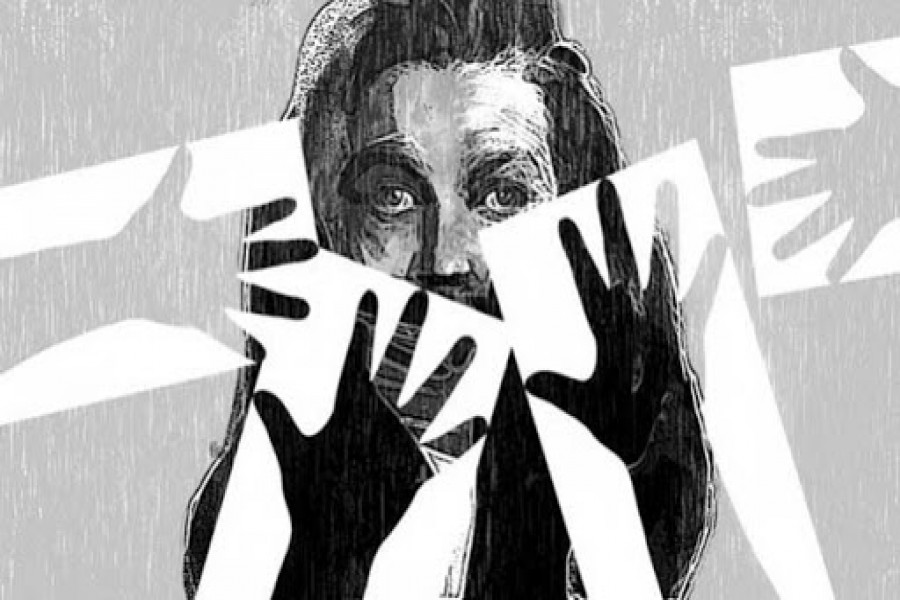The year 2020 has been dreadful, especially for the women in Bangladesh. With domestic and sexual violence against them on the rise, last year has seen the worst of their safety and freedom.
UN and other organisations’ reports suggest a manifold increase in violence against women compared with the previous year. So the question is: Is this rise a sudden phenomenon? Or is it the result of years of ignorance?
Small indulgence but bigger consequence
Indulgence in trivial offences often leads to bigger crimes. The recent rise in violence against women has raised the question whether Bangladesh harbours cruel men or it is the result of a system that has been nourishing malpractice for a long time? While the movements and protests reveal the void in the legal system, it is important to take a step back and reflect on everyday lives before bringing about bigger changes. It is also important to identify at what point one’s behaviour becomes violent and crosses the limit of indulgence. Indulgence likely begins in a friends’ group, workplace, or even in ones’ own home. We often can’t recognise behaviour as violent and don’t know how to deal with it.
What is microaggression?
In everyday life, people express their deeply-rooted beliefs against certain groups and try to justify little acts of violence exerted against them. Such behaviour is called microaggression which apparently looks harmless and is therefore forgotten. A sexist joke, an insensitive remark or a small gesture of male dominance are examples of microaggressions. Psychologists consider all sorts of biased interactions or behaviours, whether deliberate or accidental, microaggression.
Problem originates in private sphere
When children grow up in environments where it is common to generalise spanking kids on the street, or blame victims of sexual assault, or deny a man can be responsible for physical assault, they grow up conditioned to believe in these forms of violence as normal. Parents teaching their baby girl to stay home or scolding them for going out to play can have a serious mental effect on her little brother who might grow up with an aggressive mentality towards women who go out to work. Academic psychologists believe these subtle forms of discrimination are deeply manifested in one’s behaviour, interpersonal communication and environment.
“When children grow up witnessing microaggression within private spheres, they adopt a phenomenon known as performative act, which refers to the resulting behaviour that children display being influenced by certain circumstances-- in this case, microaggression and normalising violence,” said Ms Syeda SaykaTabassum, anthropologist and researcher at James P Grant School of Public Health at BRAC University.
In a country where women are usually expected to be domesticated and men are viewed as the protectors, adolescent males grow up believing they have the right to decide for women. When such belief transforms into action, men start refusing to help domestically or choose to decide when the female should step out, which are some prime instances of microaggression. Although these subtle acts of microaggression within the private sphere mostly go unnoticed, it transforms into violence over time through exerting more and more authority over females.
According to a recent report published by WHO, 53 per cent of married women in urban areas and 62 per cent of married women in rural settings have reported facing some form of domestic violence from their husbands.
To prevent such violence, it is essential to put an end to the men’s sense of authority over women from the very beginning. It is important to treat both male and female adolescents equally and make them contribute parallelly to domestic chores and educate them about respect.
Public domains are responsible too
Microaggression, however, is not only confined to the private sphere. Children become victims of microaggression in public domains too. Shoving off little children, verbally abusing and threatening when they approach for money are all acts of microaggression. These are instances when an individual considers people from a lower socio-economic background to be of lesser beings and can be apathetic to any injustice towards them.
A combined study by the Social and Economic Enhancement Programme, Society for Social Services, and Breaking the Silence reported almost 700,000 children on the streets are subjected to different forms of violence and abuse. Countering violence in such public domains is therefore just as important as dealing with violence in private domains.
Respond when needed
Humans are prone to errors. These errors can also be in the form of microaggression or unintentional discrimination within our spheres. It is important to recognise these behavioural patterns and counter them as quickly as possible. Every time a person gets belittled, an act of microaggression is committed.
“Most people are likely to ignore an act of microaggression, because either they are completely unaware of it, or want to avoid getting engaged in unlikable discourses”, said Ms Tabassum.
“Combatting microaggression cannot have a unidimensional solution. It is essential to create a safe space for conversation where the uninitiated can express her opinion without being attacked”, she added.
Smallest of discriminatory or aggressive actions need to be identified and confronted. It is important to prevent actions in private and public spheres to transform a large society that defines laws and norms.
Afraim Karim is a full-time researcher, involved with the international development sector.
[email protected]


